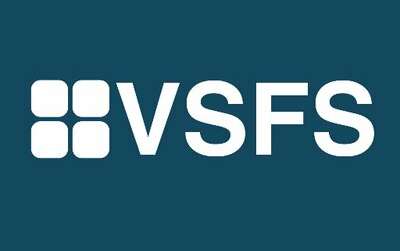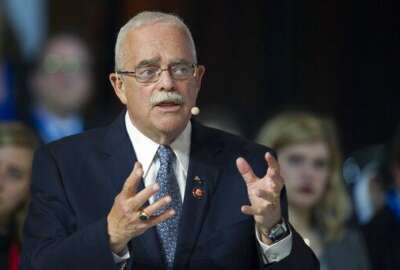
Inaugural cohort of State Dept. IT fellows enters workforce amid pandemic
The State Department has just hired its fourth annual cohort of students for its Foreign Affairs Information Technology Fellowship program.
Best listening experience is on Chrome, Firefox or Safari. Subscribe to Federal Drive’s daily audio interviews on Apple Podcasts or PodcastOne.
The State Department has just hired its fourth annual cohort of students for its Foreign Affairs Information Technology Fellowship program. The students get internships and academic funding, and later appointments to the Foreign Service. State gets badly needed talent to support the technology that supports diplomacy. For details on the program, Federal Drive with Tom Temin turned to two experts.
Interview transcript:
Tom Temin: We turned to Chelsey Jones, senior manager for federal programs [at The Washington Center]. Chelsey, good to have you on.
Chelsey Jones: Hi, thanks for having us.
Tom Temin: And Patricia Boerner, the program manager for Foreign Affairs IT Fellowships program at State. Patricia, good to have you on.
Patricia Boerner: Hi, Tom. Thanks for having us.
Tom Temin: All right, so Ms. Boerner, why don’t we start with you? Tell us the overall goals of this program and how it works. I kind of paraphrased it, but let’s hear it in your words.
Patricia Boerner: Sure. Thanks, Tom. Yes, there are a couple of goals to the program. As you can imagine, with other agencies and companies, there is a growing need for IT talent in the Foreign Service. So the FAIT Fellowship program basically supplements the Department of State hiring methods, attracting outstanding information technology students. Many of these students might not have even considered a career in public service with the Department of State. Many also need financial support for obtaining their IT degrees. So the program, sort of the second goal is aligning with the State Department’s goal of increasing diversity in the Foreign Service, which better reflects America. Department encourages women and groups which have been historically underrepresented in technology, and Americans from a variety of backgrounds to apply for the fellowship.
Tom Temin: Sure, so you’re trying to I guess dilute some of that pale, male and Yale reputation the State Department has had for all these decades?
Patricia Boerner: Yes, exactly. And we have a very diverse group of fellows right now. The fellowship provides these students with financial academic funding for the two years, and after that they’ll have their service commitment with the Department and we hope enjoy a challenging rewarding career with the Department of State in the future.
Tom Temin: All right, and Ms. Jones, you represent The Washington Center for internships and academic seminars, which is part of this. What is that group and how does it figure into the FAIT program here?
Chelsey Jones: The Washington Center is located in D.C. We work with a robust profile of partnership universities, private and public companies, and in the case of the FAIT Fellowships, federal agencies. For FAIT most specifically, we are a partnership with the Department of State and we administer the program on DOS’ behalf. We’ve been part of the FAIT program since its inception. So this is the fourth cohort and it’s the fourth cohort under the management of The Washington Center. We lean on those partnerships with universities. We facilitate a lot of payment for the tuition and assure that the students are meeting with academic qualifications for the program. The Washington Center more broadly, manages internship programs across Washington, D.C., and this falls in our kind of area of expertise because overall we work to pair, undergrad and graduate students with best-fit programming to help them turn a college degree into a career. So this is a pipeline program and really aligned with the overall mission and work of The Washington Center writ large.
Tom Temin: And now that it’s been going for four years, what is the status of the first group of cohorts that came in just four years ago?
Patricia Boerner: Yeah, so the first cohort and I believe that you interviewed them maybe a couple of years ago. They recently arrived at their first post and obviously during an unprecedented time because they arrived at their first post in March. So they are excited to begin their careers as Foreign Service information management specialists. And they’re already making great achievements at posts. If you check out the FAIT website faitfellowship.org you can hear some of their stories on the video page. And also, you know, just to learn more about careers in the Foreign Service, you can also visit careers.state.gov
Tom Temin: We’re speaking with Patricia Boerner, the program manager for the Foreign Affairs IT Fellowships program at the State Department, and Chelsey Jones, senior manager for federal programs at The Washington Center for internships in academic seminars. And what are the criteria academically for people that want to join this program? What kinds of schools do they come from? Are they studying diplomacy or IT or, or the arts or what?
Chelsey Jones: Sure, this is Chelsea and I can jump in on that, having just managed the selection process. The threshold for being able to apply is pretty low, actually. The students have to be a U.S. citizen, which obviously ties to the ability to work in the Foreign Service. They must pursue an IT-related degree and we’re pretty flexible on that, something in technology, diplomacy, cybersecurity, stuff like that. And then the final requirement is that they must have a minimum 3.2 GPA on a 4.0 scale. And one thing I want to highlight is that there are two tracks within the FAIT Fellowship – there’s an undergraduate fellowship. In that situation, the program would pay for a student to complete their junior and senior years of college on their way to achieve a bachelor’s degree. Or if there’s a graduate track, in that instance, the program would pay for them to complete a two-year master’s program in one of those IT related fields. So we think that’s a great way to make it open ended and have a possibility for folks who are even changing careers to get engaged with this exciting and important work. Kind of flow of the program follows the schedule of academic funding for two years and two internships. And then the other threshold that is a little harder to nail down is like any position in the Department of State, the students have to remain and maintain their medical and security clearances and then a suitability requirement. And that’s something that’s facilitated as they start into the program. So there’s no expectation that they have those clearances or anything upon application, and they don’t need it to be selected. We work with them to facilitate all of those moving pieces.
Tom Temin: Got it, and Patty what do they do once they arrive at a post? I mean, I hear diplomacy and IT kind of the same title. They don’t wear sashes and have high tea with foreign potentates. But what do they do?
Patricia Boerner: This I could go on and on. The duties and responsibilities of Foreign Service information management are vast. I’ll try to give you an overview and just just touch on a few of the highlights. We have almost 270 missions overseas worldwide, as well as information management specialists may be assigned in the United States for some time. Basically, they develop, they maintain and they operate the IT platforms that are necessary to support the Department of State’s domestic operations and of course, the diplomatic missions in their national security and foreign policy functions. You know, it really depends upon the size of the mission, and in saying “mission” I mean the embassy or consulate in which they work. And the requirements of the specific diplomatic mission as far as what their duties are, it can vary slightly. You know, they don’t only support computers at posts, they might be working with the phone, handheld radios, other devices. And one of the important things they do overseas is manage the diplomatic pouch, which is the way the State Department transports sensitive materials and communication. They’re also in charge, oftentimes with supervising locally employed staff who are within their purview. They manage and operate the classified and unclassified client server solution, desktop systems – I mean, the list goes on and on. Just troubleshooting technical problems, managing local area network, anything that is IT related. One of the best benefits is that information management specialists receive customized training and all the responsibilities and they attend just like Foreign Service officers do and Foreign Service generalists. They get their training at the Foreign Service Institute, where they learn everything from cable installation to video conferencing support, you know, learning about emergency communications equipment post. So you know, the list, the list goes on and on. I mentioned the website earlier, there are a lot of videos that explain to prospective fellows what the job of the information management specialist entails. But that’s just sort of a brief overview, what they’re doing overseas and also here in the U.S.
Tom Temin: And you mentioned overseas, they might supervise locally hired staff. So in a sense, that’s a little bit of diplomacy itself, isn’t it?
Patricia Boerner: Oh, exactly, yeah. And I mean, they’re also collaborating with host country officials on telecommunication issues within that country. So they’re not just within the embassy. They’re also part of our diplomatic mission with the local host country.
Tom Temin: And finally, now that they are in the State Department, those first cohorts just arriving at their posts or virtually I guess, at the point. Hopefully they can get there in person. What is the plan to kind of help State Department retain them, give them the type of career path that might make them long term employees? Because after you’ve invested so much to get them in, you want to have them hang around a while, I guess.
Patricia Boerner: Yeah, exactly. And so actually, Tom they are there they are physically at their, at their posts right now – by fellows. They got there – it’s a little different. Some might be going into the embassy or consulate. Others are working virtually, but they’re there in the in the host country. They have mentors, they have support while they’re overseas from the embassy of the consulate that they’re working with. So all of the fellows, once they finish the program, they have a minimum five-year commitment You know, we assume and hope that they’re going to stay longer. I mean, overall, you know, we don’t have any data on the first cohort because they’ve just started, but we know that overall the retention rate for all IT specialists in the Foreign Service is about 95%
Tom Temin: Turn back the clock 50 years I’d probably apply myself. Patricia Boerner is the program manager for Foreign Affairs IT Fellowships at the State Department. Thanks so much for joining me.
Patricia Boerner: Oh, thank you for having me today.
Tom Temin: And Chelsey Jones is senior manager for federal programs at The Washington Center for internships and academic seminars. Thank you also.
Chelsey Jones: Thanks so much. It’s been a treat.
Tom Temin: We’ll post this interview at FederalNewsNetwork.com/FederalDrive. Hear the Federal Drive on demand. Subscribe at Apple Podcasts or Podcastone.
Copyright © 2025 Federal News Network. All rights reserved. This website is not intended for users located within the European Economic Area.
Tom Temin is host of the Federal Drive and has been providing insight on federal technology and management issues for more than 30 years.
Follow @tteminWFED





